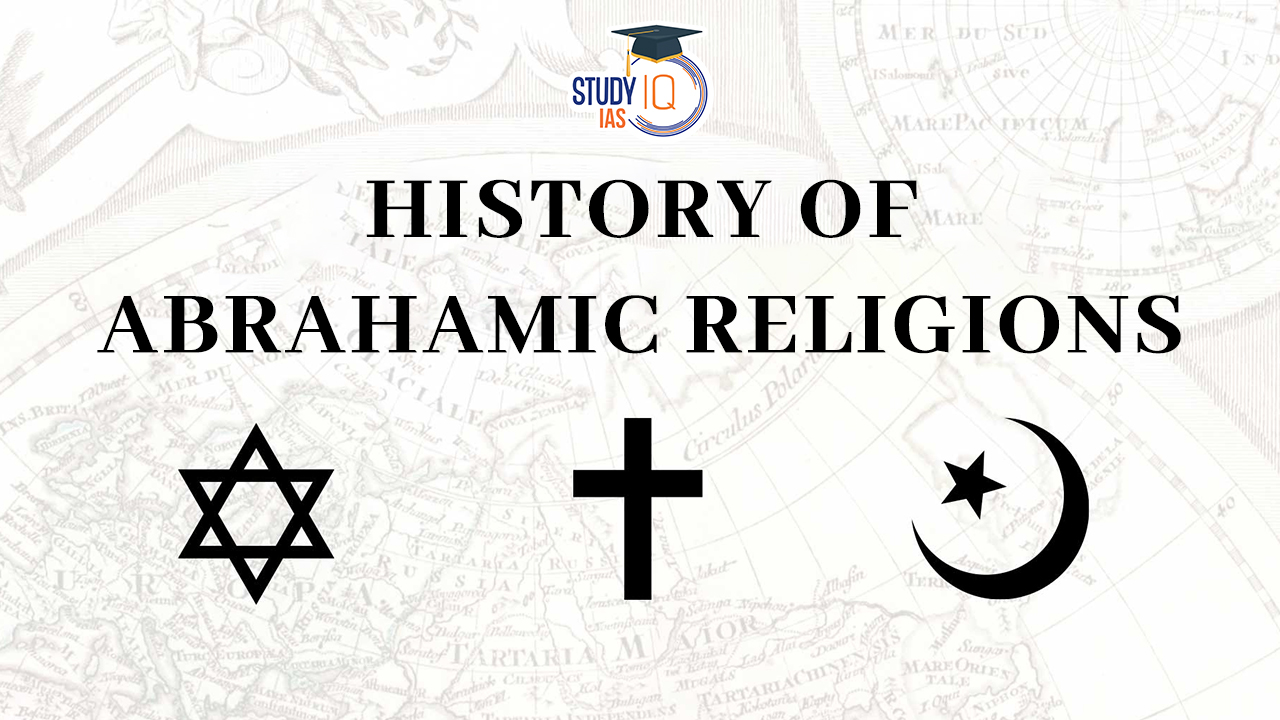Table of Contents
The Abrahamic religions are a group of monotheistic religions that trace their spiritual lineage to the figure of Abraham. The three major Abrahamic religions are Judaism, Christianity, and Islam. Throughout history, these religions have played significant roles in shaping the cultures, societies, and civilizations in which they have been practiced. Interactions and conflicts among followers of these religions have also influenced global history, from the medieval Crusades to the contemporary geopolitics of the Middle East. Know The History of Abrahamic Religions in this Article.
We’re now on WhatsApp. Click to Join
Origin of Abrahamic Religions
- Abrahamic Faiths: Group of religions centered on worship of the God of Abraham, including Judaism, Christianity, and Islam.
- Lineage Claims: Jewish tradition traces Twelve Tribes of Israel to Abraham’s descendants through Isaac and Jacob, while Islam asserts the Ishmaelites’ descent in the Arabian Peninsula.
- Religious Evolution: Early Israelite religion rooted in Canaanite beliefs; evolved from polytheism to monolatry and later monotheism.
- Christianity’s Emergence: 1st century AD, Christianity emerged from Judaism in the Land of Israel under Jesus’ Apostles, later adopted by the Roman Empire in the 4th century AD.
- Islam’s Origin: Founded by Muhammad in 7th century AD in the Arabian Peninsula, spreading widely through early Muslim conquests after his death.
- Global Influence: Abrahamic religions, alongside other major divisions, play a significant role in comparative religion; Christianity and Islam lead in global adherents.
- Minor Abrahamic Religions: Include Judaism, the Baháʼí Faith, Druzism, Samaritanism, and Rastafari with fewer followers.
Judaism
Judaism, with a rich history documented in the Tanakh, unfolds from the early relationship between the Israelites and God until the construction of the Second Temple around 535 BCE. Abraham, recognized as the inaugural Hebrew and patriarch of the Jewish people, saw his lineage, including his great-grandson Judah, lending the religion its name. Initially, the Israelites comprised various tribes in the Kingdom of Israel and Kingdom of Judah.
Post-conquest and exile, some from the Kingdom of Judah returned to Israel, forming an independent state under the Hasmonean dynasty in the 2nd and 1st centuries BCE. However, it later became a client kingdom of the Roman Empire, which eventually conquered and dispersed its inhabitants. Between the 2nd and 6th centuries, Rabbinical Jews, often traced back to the historical Pharisees, compiled the Talmud. This extensive work encompasses legal rulings and Biblical exegesis and, alongside the Tanakh, constitutes a fundamental text in Rabbinical Judaism. It’s important to note that Karaite Jews, believed to descend from the Sadducees, and the Beta Israel reject the Talmud and the concept of an Oral Torah, adhering solely to the Tanakh.
Christianity
Christianity, rooted in the teachings of the Bible, began in the 1st century as a sect within Judaism under the leadership of Jesus. Initially considered the Messiah by his followers, after his crucifixion and death, he came to be viewed as God incarnate who would return to judge the living and the dead, establishing an eternal Kingdom of God. The movement eventually separated from Judaism, and Christian doctrine is based on the Old and New Testaments. Despite becoming the state church of the Roman Empire in 380, Christianity experienced divisions, notably with the East–West Schism in 1054 and the birth of Protestantism during the 16th-century Reformation.
Islam
Islam, rooted in the teachings of the Quran, regards Muhammad as the Seal of the prophets, with the concept of submission (Islam) preached by all Abrahamic prophets. The Quran, considered a revelation from God, acknowledges prior scriptures like the Tawrat (Torah), Zabur (Psalms), and Injil (Gospel). It also mentions the Scrolls of Abraham and Moses. Muslims believe the Quran is the final and direct word of God. Islam, like Christianity, is universal and adheres to strict monotheism (tawhid). Its teachings emphasize submission to God and include a comprehensive moral and legal code. The faith’s history involves the spread of Islam across various regions, establishment of caliphates, and contributions to science, philosophy, and culture.
Common Aspects of Abrahamic Religions
- Abrahamic Origin: All Abrahamic religions accept the tradition that God revealed himself to the patriarch Abraham. They share a common historical and spiritual lineage.
- Monotheism: Judaism, Christianity, and Islam are all monotheistic religions, worshipping an exclusive God. Although the nature of God may be understood differently, they all conceive God as a transcendent creator and the source of moral law.
- Transcendence of God: In the Abrahamic religions, God is seen as a transcendent creator, separate from the individual and the universe. The individual and nature are both considered subordinate to God.
- Similar Figures, Histories, and Places: The religious texts of these traditions feature many common figures, histories, and places. However, these may be presented with different roles, perspectives, and meanings in each religion.
- Positive Attitudes: Believers who acknowledge the commonalities and the Abrahamic origin tend to have more positive attitudes towards other Abrahamic groups.
- Salvation and Transcendence: Seeking salvation or transcendence is not achieved through contemplating the natural world or philosophical speculation. Instead, it involves seeking to please God through obedience to His wishes or laws.
- Divergent Views on Jesus: While both Christianity and Islam revere Jesus, they have vastly differing conceptions. Christians view Jesus as the savior and God incarnate, while Muslims see him as a Prophet of Islam and the Messiah. The worship of Jesus is viewed differently, with Islam and Judaism considering it a form of heresy.
- Theological Continuity: Abrahamic religions share the belief in one eternal God who created the universe, rules history, sends messengers, and reveals divine will through inspired revelation. They have a teleological view of history, unlike the static or cyclic views found in other cultures.
- Scriptures: All Abrahamic religions believe in guidance from God through revelation to prophets, and each religion has its own set of scriptures documenting these revelations.
- Ethical Orientation: A common ethical orientation is found in these religions, emphasizing the choice between good and evil, obedience or disobedience to a single God and Divine Law.
- Eschatological Worldview: Abrahamic religions share an eschatological worldview, believing in a purposeful unfolding of history that will culminate in a resurrection of the dead, final judgment, and a world to come.
- Importance of Jerusalem: Jerusalem holds significant religious importance for Judaism, Christianity, and Islam. It is considered the holiest city in Judaism and has been a continuous center for Christianity. Muslims regard it as the third holiest city after Mecca and Medina, with historical and religious significance, including the Al-Aqsa mosque and the Miʿrāj event in Islamic tradition.
Differences of Abrahamic Religions
- Concepts of God:
- Abrahamic: Eternal, omnipotent, and creator.
- Jewish: Strict monotheism, revealed aspect.
- Christian: Trinity, divinity of Jesus.
- Islamic: All-powerful, singular, and unique.
- Scriptures:
- Judaism: Tanakh, oral traditions.
- Christianity: Old and New Testament.
- Islam: Quran, Hadith.
- Circumcision:
- Judaism: Commandment, religious.
- Christianity: Neutral, cultural.
- Islam: Sunnah, not obligatory.
- Dietary Restrictions:
- Judaism: Kosher laws.
- Christianity: Varied, often not strict.
- Islam: Halal laws.
- Sabbath Observance:
- Judaism: Weekly Shabbat.
- Christianity: Varied observance.
- Islam: Jumu’ah, not a day of rest.
- Proselytism:
- Judaism: Converts accepted.
- Christianity: Encourages evangelism.
- Islam: Emphasizes Da’wah (preaching).
History of Abrahamic Religions UPSC
The Abrahamic religions, including Judaism, Christianity, and Islam, share a spiritual lineage traced back to Abraham. Originating from the worship of the God of Abraham, these monotheistic faiths have influenced global history and culture. Judaism’s rich history involves the Twelve Tribes, forming an independent state, and the compilation of the Talmud. Christianity emerged in the 1st century, separating from Judaism and experiencing doctrinal divisions. Islam, founded by Muhammad in the 7th century, emphasizes submission and spread through conquests. Commonalities include monotheism, transcendence of God, shared figures, and ethical orientation, while differences exist in their concepts of God, scriptures, practices, and proselytism.


 Bihu Festival and Dance of Assam, Histor...
Bihu Festival and Dance of Assam, Histor...
 Chittorgarh Fort: Mining Ban within 10 k...
Chittorgarh Fort: Mining Ban within 10 k...
 PM Modi visits Wat Pho Temple in Bangkok
PM Modi visits Wat Pho Temple in Bangkok





















